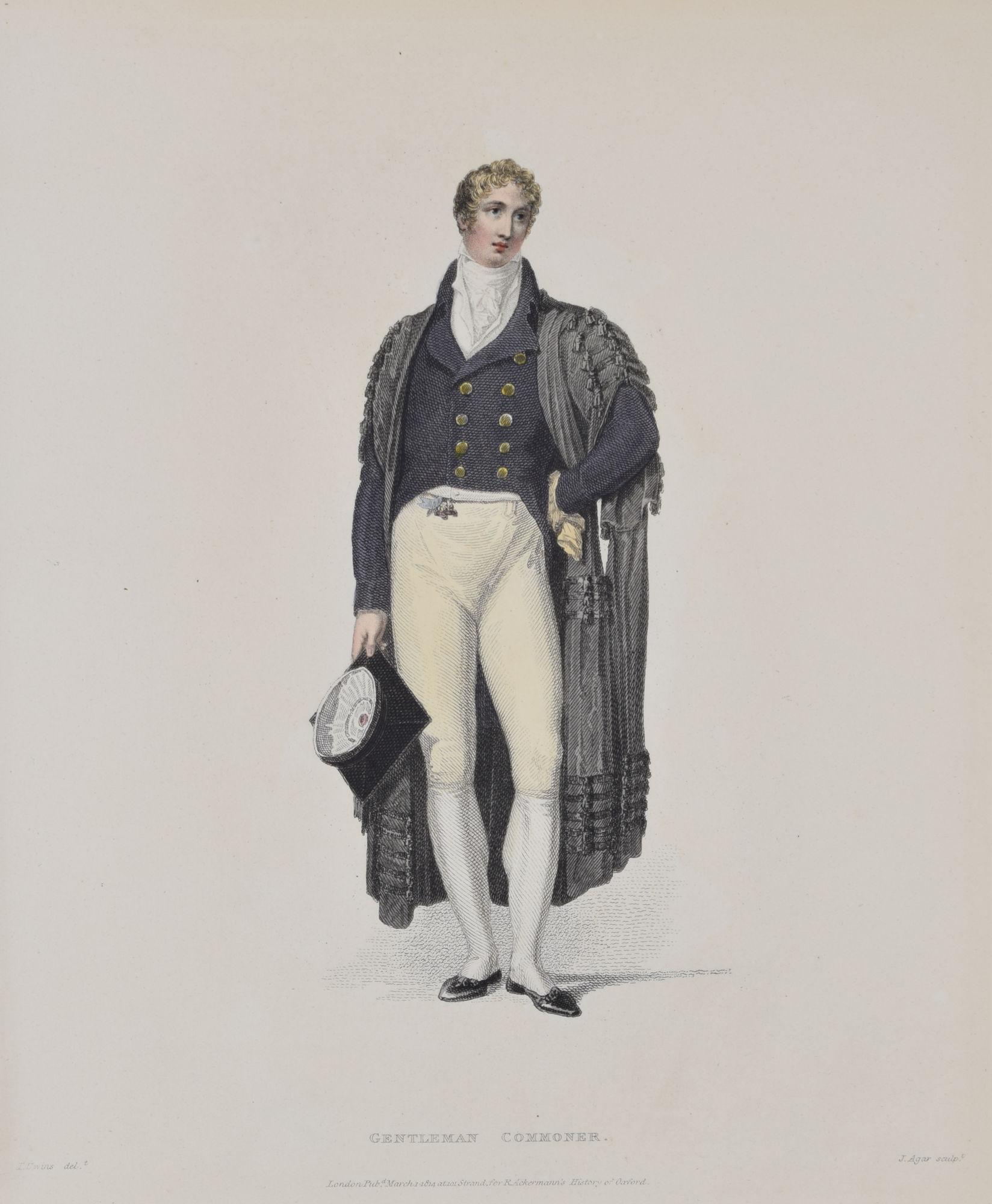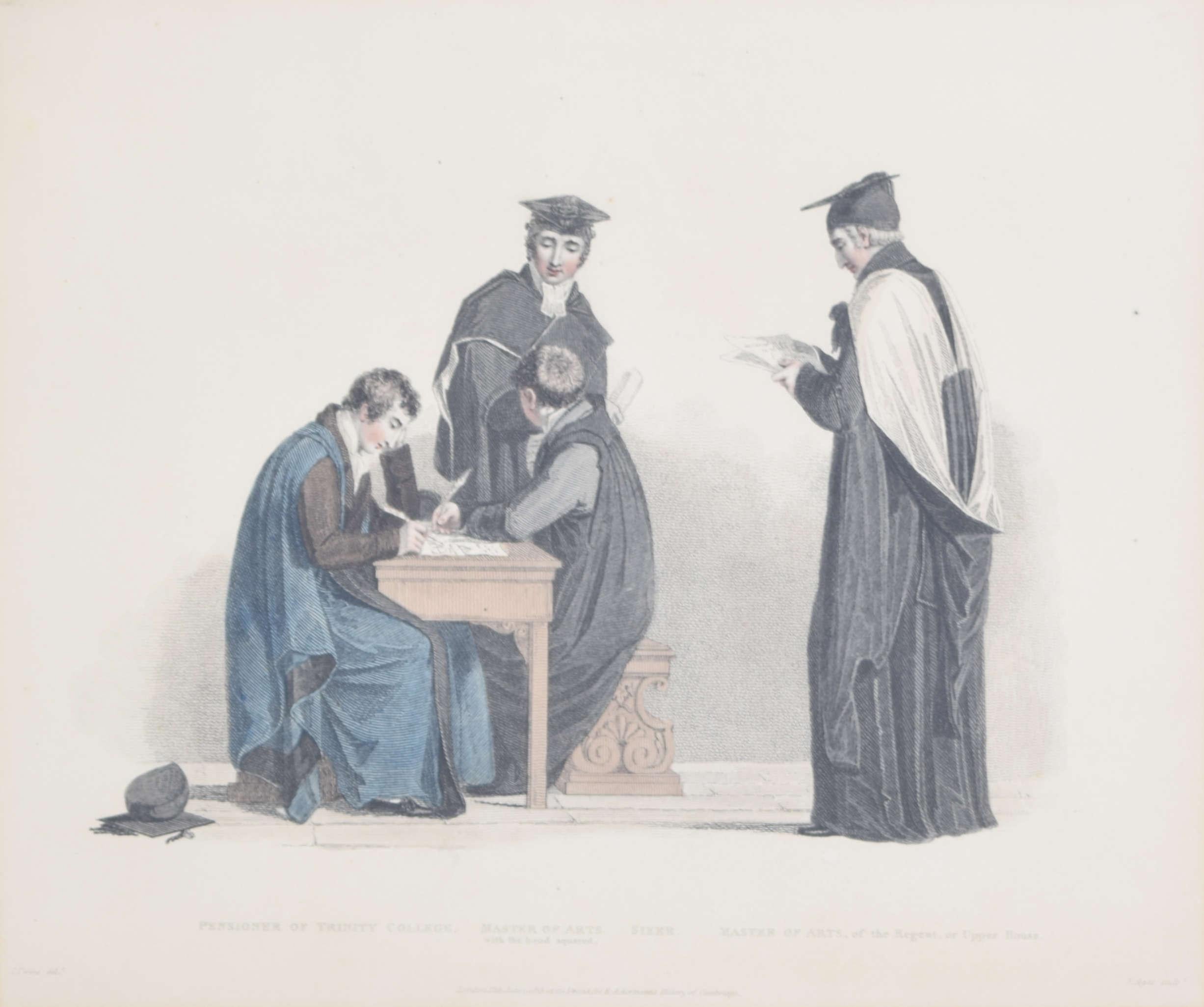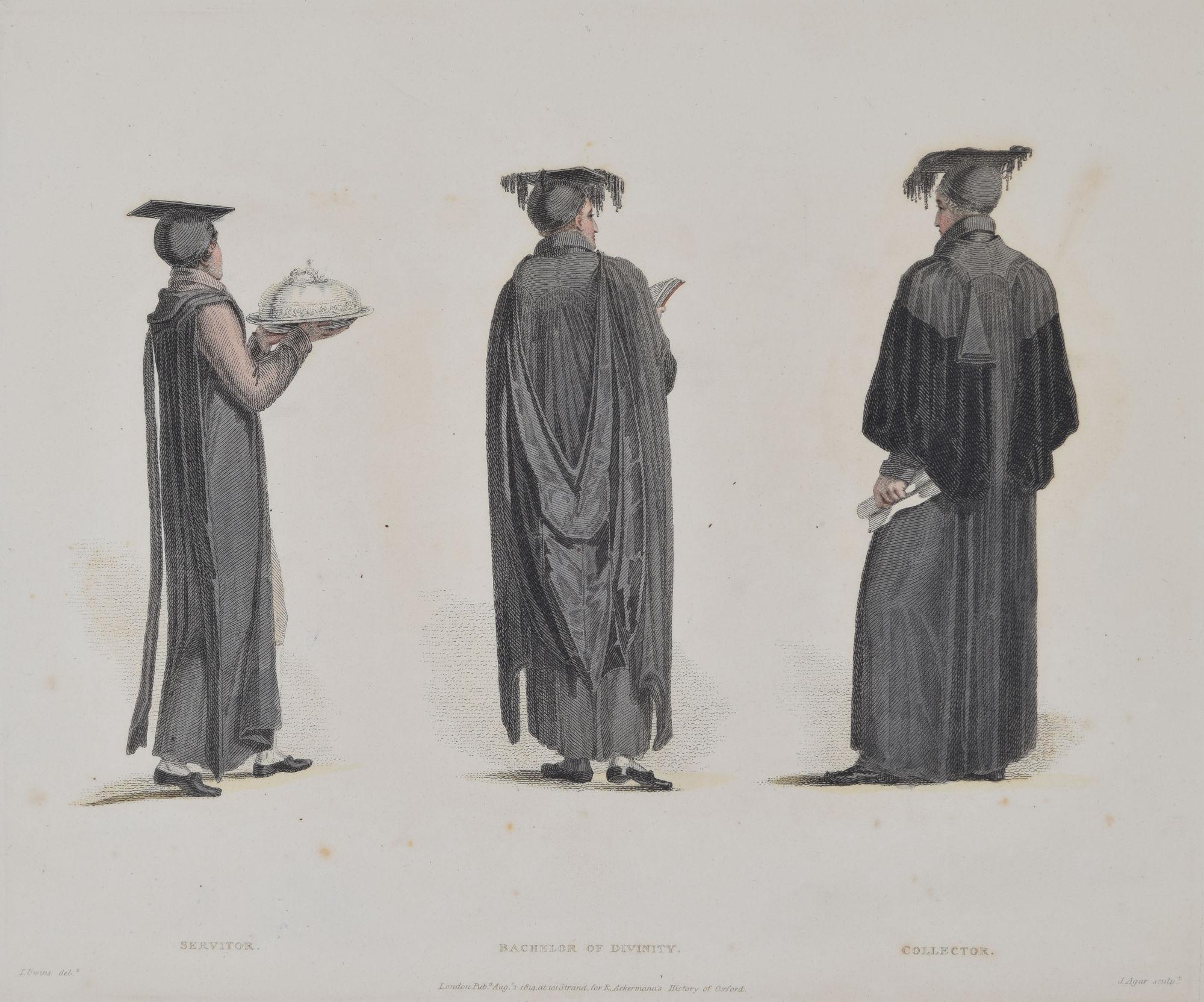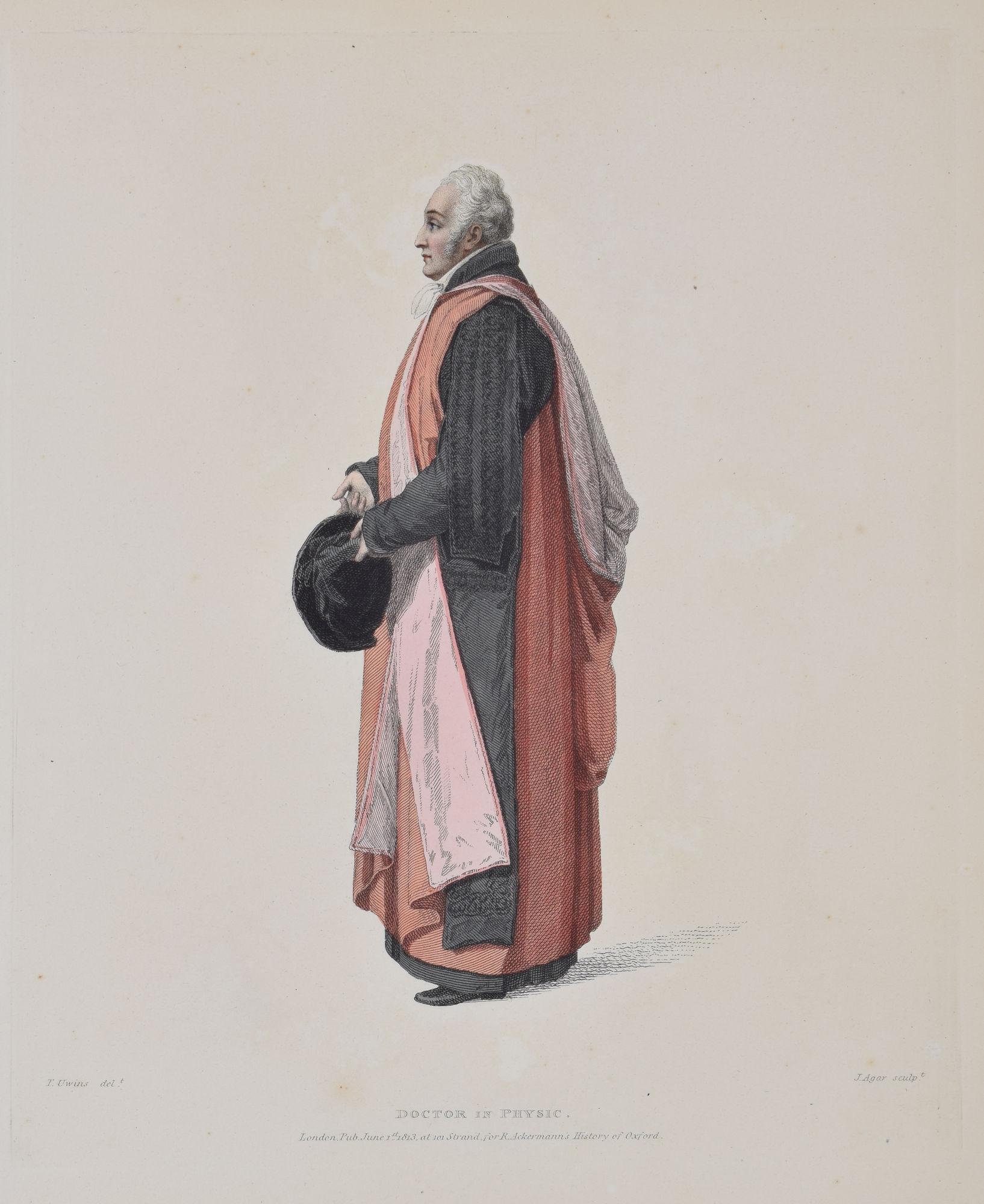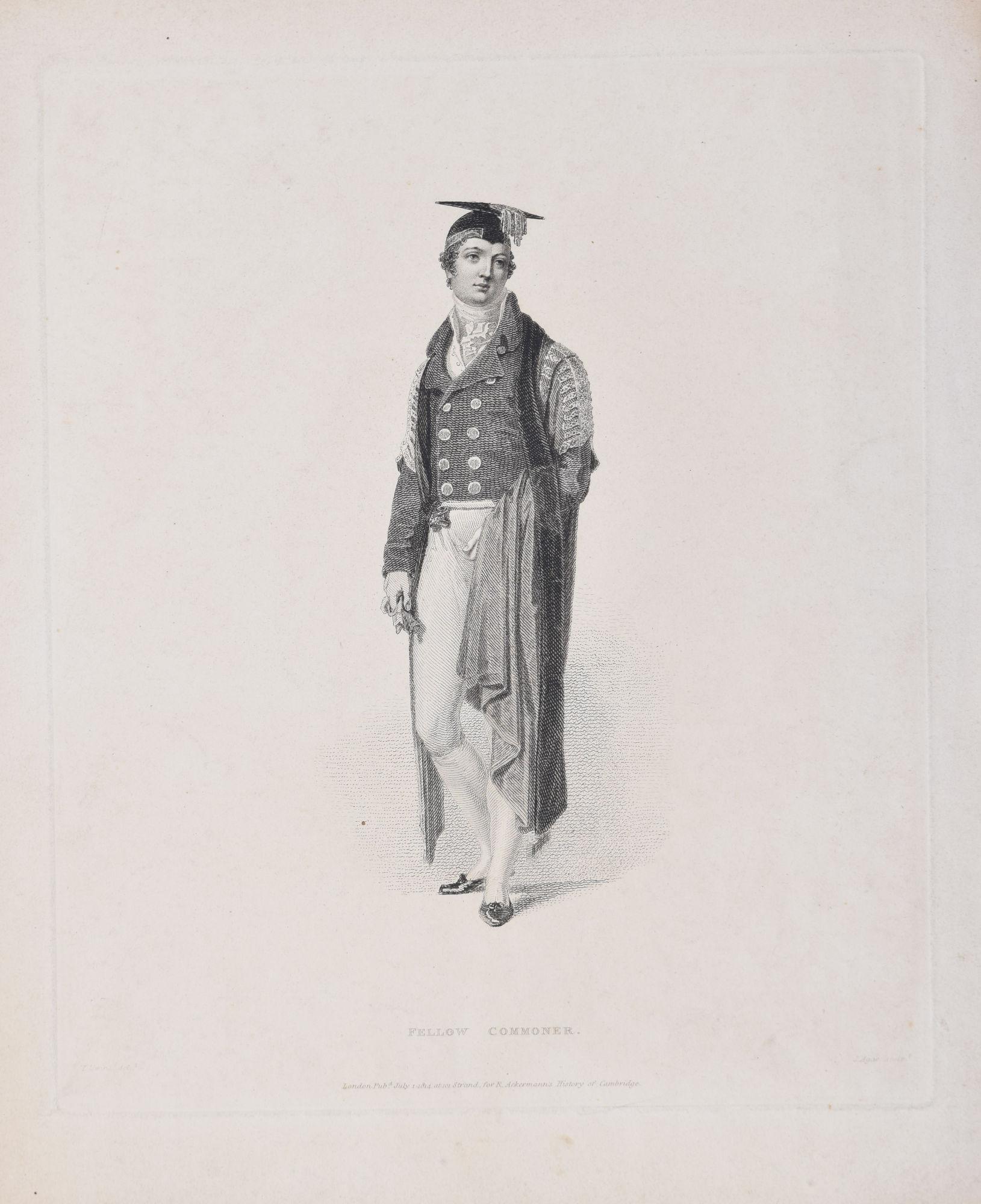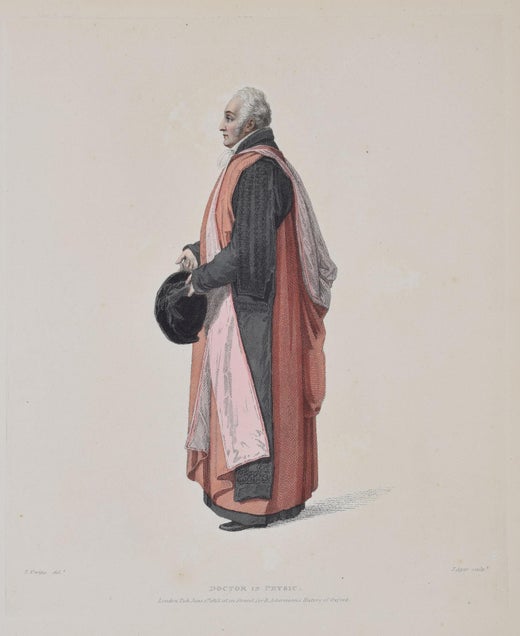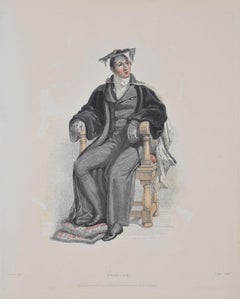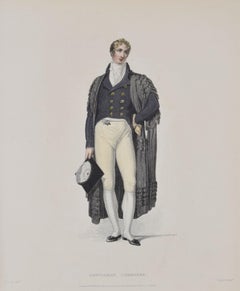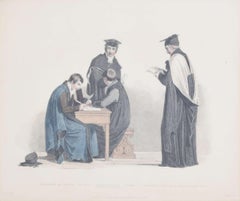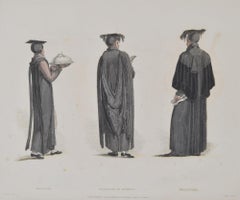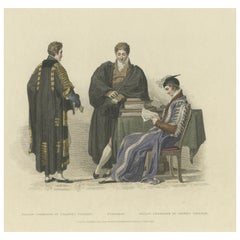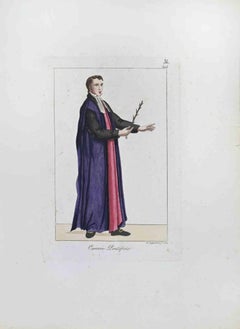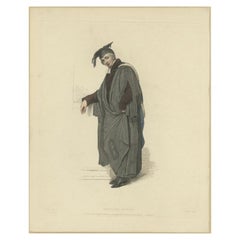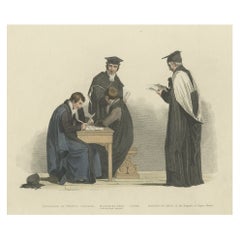Items Similar to University of Cambridge Nobleman engraving by John Agar
Want more images or videos?
Request additional images or videos from the seller
1 of 5
Rudolph AckermannUniversity of Cambridge Nobleman engraving by John Agar1815
1815
$301.57
£225
€260.33
CA$422.15
A$465.18
CHF 241.28
MX$5,532.63
NOK 3,052.11
SEK 2,859.18
DKK 1,944.24
About the Item
To see our other Oxford and Cambridge pictures, including an extensive collection of works by Ackermann, scroll down to "More from this Seller" and below it click on "See all from this Seller" - or send us a message if you cannot find the view you want.
John Samuel Agar (1773 - 1858) after John Uwins (1782 - 1857)
Nobleman, Cambridge (1815)
Aquatint with original hand colouring
30 x 25 cm
Published by Rudolph Ackermann (1764 - 1834).
An engraving of a nobleman studying at Cambridge, from Ackermann's 'A History of the University of Cambridge, Its Colleges, Halls and Public Buildings'.
Thomas Uwins RA RWS was a British painter in watercolour and oil, and a book illustrator. He became a full member of the Old Watercolour Society and a Royal Academician, and held a number of high-profile art appointments including the librarian of the Royal Academy, Surveyor of Pictures to Queen Victoria and the Keeper of the National Gallery. In the late 1790s he began producing work for Ackermann's collections.
John Samuel Agar was an English portrait painter and engraver, who exhibited his works at the Royal Academy from 1796 to 1806 and at the British Institution until 1811. He was at one time president of the Society of Engravers. Rudolph Ackermann published many of his engravings.
Ackermann was an Anglo-German bookseller, inventor, lithographer, publisher and businessman. He attended the Latin school in Stollberg, but his wish to study at the university was made impossible by lack of financial means, and he therefore became a saddler like his father.
He worked as a saddler and coach-builder in different German cities, moved from Dresden to Basel and Paris, and then, 23 years old, settled in London. He established himself in Long Acre, the centre of coach-making in London and close to the market at Covent Garden.
Ackermann then moved to Little Russell Street where he published Imitations of Drawings of Fashionable Carriages (1791) to promote his coach-making. Other publications followed. In 1795 he established a print-shop and drawing-school at 96 Strand. Here Ackermann set up a lithographic press and began a trade in prints. He later began to manufacture colours and thick carton paper for landscape and miniature painters. Within three years the premises had become too small and he moved to 101 Strand, in his own words "four doors nearer to Somerset House", the seat of the Royal Academy of Arts.
Between 1797 and 1800 Ackermann rapidly developed his print and book publishing business, encompassing many different genres including topography, caricature, portraits, transparencies and decorative prints.
During the Napoleonic wars, Ackermann was an energetic supporter of the Allied cause and made significant contributions to British propaganda through his publication of anti-Napoleonic prints and military manuals. He became a naturalised British citizen in March 1809.
As one of the pioneers of modern publishing methods, Ackermann developed an international distribution network for his publications and came to have significant commercial interests in South America. The business he founded in London flourished throughout the 19th century under the management of his descendants. He was buried at St. Clement Danes in the Strand, London.
In 2020, the St. Louis Mercantile Library wrote that:
"Ackermann excelled in the creation of landscape and architectural engravings. He created beautiful illustrations of the city of London, his adopted home, as well as two volumes of classic views of Westminster Abbey, along with exquisite views of river scenes. One of our favorite collections are four massive volumes of lovingly illustrated exterior and interior landmarks of Oxford and Cambridge Universities created just over two hundred years ago. These publications show Ackermann’s hand at every turn of the page along with the team of assistant designers and engravers he employed to create these works. Perhaps they were a way by which the artist could lay to rest his own regret at not being able to attend [an Oxbridge] college himself in a fondly depicted idyll to learning which these prints so aptly represent."
- Creator:Rudolph Ackermann (1764 - 1834)
- Creation Year:1815
- Dimensions:Height: 11.82 in (30 cm)Width: 9.85 in (25 cm)
- Medium:
- Period:
- Framing:Framing Options Available
- Condition:Paper slightly toned within platemark.
- Gallery Location:London, GB
- Reference Number:1stDibs: LU795314868852
Rudolph Ackermann was an Anglo-German bookseller, inventor, lithographer, publisher and businessman. In 1795 he established a print-shop and drawing-school at 96 Strand. Here Ackermann set up a lithographic press and began a trade in prints. He later began to manufacture colours and thick carton paper for landscape and miniature painters. Within three years the premises had become too small and he moved to 101 Strand, in his own words "four doors nearer to Somerset House", the seat of the Royal Academy of Arts. Between 1797 and 1800 Ackermann rapidly developed his print and book publishing business, encompassing many different genres including topography, caricature, portraits, transparencies, and decorative prints.
About the Seller
4.8
Vetted Professional Seller
Every seller passes strict standards for authenticity and reliability
Established in 2014
1stDibs seller since 2017
361 sales on 1stDibs
Typical response time: 13 hours
- ShippingRetrieving quote...Shipping from: London, United Kingdom
- Return Policy
More From This Seller
View AllProctor, University of Oxford engraving by Agar after Uwins for Ackermann
Located in London, GB
To see our other Oxford and Cambridge pictures, including an extensive collection of works by Ackermann, scroll down to "More from this Seller" and below it click on "See all from th...
Category
1810s Prints and Multiples
Materials
Aquatint
Gentleman Commoner, University of Oxford 1814 engraving by John Agar
Located in London, GB
To see our other Oxford and Cambridge pictures, including an extensive collection of works by Ackermann, scroll down to "More from this Seller" and below it click on "See all from th...
Category
1810s Realist Prints and Multiples
Materials
Aquatint
MA Masters of Arts and Trinity College, Cambridge member engraving by John Agar
Located in London, GB
To see our other Oxford and Cambridge pictures, including an extensive collection of works by Ackermann, scroll down to "More from this Seller" and below it click on "See all from this Seller" - or send us a message if you cannot find the view you want.
John Samuel Agar (1773 - 1858) after John Uwins (1782 - 1857)
Pensioner of Trinity College, Cambridge, Masters of Arts, and Sizer (1815)
Hand-coloured aquatint
25 x 30 cm
Published by Rudolph Ackermann (1764 - 1834).
An engraving of a pensioner of Trinity College, Masters of Arts, and a sizer (that is, an undergraduate who received some form of assistance such as meals, lower fees or lodging during his period of study, in some cases in return for doing a defined job) from Ackermann's 'A History of the University of Cambridge, Its Colleges, Halls and Public Buildings'. The four figures walk forward with ceremonial accoutrements, possibly to a graduation ceremony.
At Cambridge, a sizar was originally an undergraduate student who financed his studies by undertaking more or less menial tasks within his college but, as time went on, was increasingly likely to receive small grants from the college. Certain colleges, including St John's and Trinity, distinguished between two categories of sizar: there were specific endowments for specific numbers of sizars who were called "proper sizars"; those who were not so endowed, but who were maintained by fellow-commoners and fellows were called subsizars. Isaac Newton matriculated as subsizar at Trinity College. Richard S. Westfall noted that sizars were considerably more successful in gaining degrees than the gentlemen who entered Cambridge in the seventeenth century. Pensioners, on the other hand, paid a fixed annual fee in order to study.
Thomas Uwins RA RWS was a British painter in watercolour and oil, and a book illustrator. He became a full member of the Old Watercolour Society and a Royal Academician, and held a number of high-profile art appointments including the librarian of the Royal Academy, Surveyor of Pictures to Queen Victoria and the Keeper of the National Gallery. In the late 1790s he began producing work for Ackermann's collections.
John Samuel Agar was an English portrait painter and engraver, who exhibited his works at the Royal Academy from 1796 to 1806 and at the British Institution until 1811. He was at one time president of the Society of Engravers. Rudolph Ackermann published many of his engravings.
Ackermann was an Anglo-German bookseller, inventor, lithographer, publisher and businessman. He attended the Latin school in Stollberg, but his wish to study at the university was made impossible by lack of financial means, and he therefore became a saddler like his father.
He worked as a saddler and coach-builder in different German cities, moved from Dresden to Basel and Paris, and then, 23 years old, settled in London. He established himself in Long Acre, the centre of coach-making in London and close to the market at Covent Garden.
Ackermann then moved to Little Russell Street where he published Imitations of Drawings of Fashionable Carriages (1791) to promote his coach-making. Other publications followed. In 1795 he established a print-shop and drawing-school at 96 Strand. Here Ackermann set up a lithographic press and began a trade in prints. He later began to manufacture colours and thick carton paper for landscape and miniature painters. Within three years the premises had become too small and he moved to 101 Strand, in his own words "four doors nearer to Somerset House", the seat of the Royal Academy of Arts.
Between 1797 and 1800 Ackermann rapidly developed his print and book publishing business, encompassing many different genres including topography, caricature, portraits, transparencies and decorative prints.
During the Napoleonic wars, Ackermann was an energetic supporter of the Allied cause and made significant contributions to British propaganda through his publication of anti-Napoleonic prints...
Category
1810s Prints and Multiples
Materials
Aquatint
University of Oxford Bachelor engraving by Agar after Uwins for Ackermann
Located in London, GB
To see our other Oxford and Cambridge pictures, including an extensive collection of works by Ackermann, scroll down to "More from this Seller" and below it click on "See all from this Seller" - or send us a message if you cannot find the view you want.
John Samuel Agar (1773 - 1858) after John Uwins (1782 - 1857)
Servitor, Bachelor of Divinity, Collector (1814)
Aquatint with original hand colouring
24 x 29 cm
Published by Rudolph Ackermann (1764 - 1834).
A Servitor; Bachelor of Divinity; and Collector of the University of Oxford.
Thomas Uwins RA RWS was a British painter in watercolour and oil, and a book illustrator. He became a full member of the Old Watercolour Society and a Royal Academician, and held a number of high-profile art appointments including the librarian of the Royal Academy, Surveyor of Pictures to Queen Victoria and the Keeper of the National Gallery. In the late 1790s he began producing work for Ackermann's collections.
John Samuel Agar was an English portrait painter and engraver, who exhibited his works at the Royal Academy from 1796 to 1806 and at the British Institution until 1811. He was at one time president of the Society of Engravers. Rudolph Ackermann published many of his engravings.
Ackermann was an Anglo-German bookseller, inventor, lithographer, publisher and businessman. He attended the Latin school in Stollberg, but his wish to study at the university was made impossible by lack of financial means, and he therefore became a saddler like his father.
He worked as a saddler and coach-builder in different German cities, moved from Dresden to Basel and Paris, and then, 23 years old, settled in London. He established himself in Long Acre, the centre of coach-making in London and close to the market at Covent Garden.
Ackermann then moved to Little Russell Street where he published Imitations of Drawings of Fashionable Carriages (1791) to promote his coach-making. Other publications followed. In 1795 he established a print-shop and drawing-school at 96 Strand. Here Ackermann set up a lithographic press and began a trade in prints. He later began to manufacture colours and thick carton paper for landscape and miniature painters. Within three years the premises had become too small and he moved to 101 Strand, in his own words "four doors nearer to Somerset House", the seat of the Royal Academy of Arts.
Between 1797 and 1800 Ackermann rapidly developed his print and book publishing business, encompassing many different genres including topography, caricature, portraits, transparencies and decorative prints.
During the Napoleonic wars, Ackermann was an energetic supporter of the Allied cause and made significant contributions to British propaganda through his publication of anti-Napoleonic prints...
Category
1810s Prints and Multiples
Materials
Aquatint
Doctor in Physic, University of Oxford 1813 engraving by John Agar
Located in London, GB
To see our other Oxford and Cambridge pictures, including an extensive collection of works by Ackermann, scroll down to "More from this Seller" and below it click on "See all from th...
Category
1810s Realist Prints and Multiples
Materials
Aquatint
Fellow Commoner, University of Oxford 1814 engraving by John Agar
Located in London, GB
To see our other Oxford and Cambridge pictures, including an extensive collection of works by Ackermann, scroll down to "More from this Seller" and below it click on "See all from th...
Category
1810s Realist Prints and Multiples
Materials
Aquatint
You May Also Like
Old Print of Nobleman and Fellow-Commoners of Trinity and Emanuel College, 1815
By Ackermann and Fritze 1
Located in Langweer, NL
Antique print titled 'Fellow Commoner of Emanuel College - Nobleman - Fellow Commoner of Trinity College'. Portraits of a Fellow Commoner of Emanuel, Nobleman, and Fellow Commoner of...
Category
Antique 19th Century Prints
Materials
Paper
$340 Sale Price
20% Off
"Cursore Pontificio" - Etching by Giuseppe Capparoni - 1827
Located in Roma, IT
"Cursore Pontificio" is an Artwork realized in 1827 by the Engraver, Giuseppe Capparoni (Rome 1800- 1879).
Etching hand colored on ivory paper. Signed on plate and dated on the righ...
Category
1820s Modern Portrait Prints
Materials
Etching
Antique Print of a Bachelor of Laws by Ackermann, 1813
Located in Langweer, NL
Antique print titled 'Bachelor of Laws. Portrait of a Bachelor of Laws made after a drawing by Thomas Uwins. This print originates from 'Ackermann's History of Oxford and History of ...
Category
Antique 19th Century Prints
Materials
Paper
$338 Sale Price
20% Off
Nice Antique Print of a Master in Arts and Academics of Trinity College, 1815
Located in Langweer, NL
Antique print titled 'Pensioner of Trinity College - Master of Arts - Sizer - Master of Arts, of the regent, or Upper House'. Portraits of four men in academic costumes; a college ca...
Category
Antique 19th Century English Prints
Materials
Paper
$338 Sale Price
20% Off
"Caudatario" in the Chapel - Etching by Giuseppe Capparoni - 1827
Located in Roma, IT
"Caudatario" in the Chapel is an Artwork realized in 1827 by the Engraver, Giuseppe Capparoni (Rome 1800- 1879).
Etching hand colored on ivory paper. Signed on plate and dated on th...
Category
1820s Modern Portrait Prints
Materials
Etching
Academic Costumes; a Pensioner of Trinity Hall, a Doctor of Physics & Law, 1815
Located in Langweer, NL
Antique print titled 'Pensioner of Trinity Hall - Common Dress of the Doctor in Law & The Doctor in Physic'.
Portraits of three men in academic costum...
Category
Antique 1810s Prints
Materials
Paper
More Ways To Browse
Antique University
Architectural Engraving
Antique Surveyor
Antique Mercantile
Gustav Klimt Original
Harold Altman Lithographs
Hebrew Lithograph
Henri Matisse Original Lithographs
Henry Moore Etching
Imaginations And Objects Of The Future Portfolio
Japanese Print Gold
Jazz Festival Poster
Katz Morris
Keith Haring 1984
Leroy Neiman Signed
Marc Chagall Jerusalem Windows
Marchal Poster
Mark Kostabi On Sale

